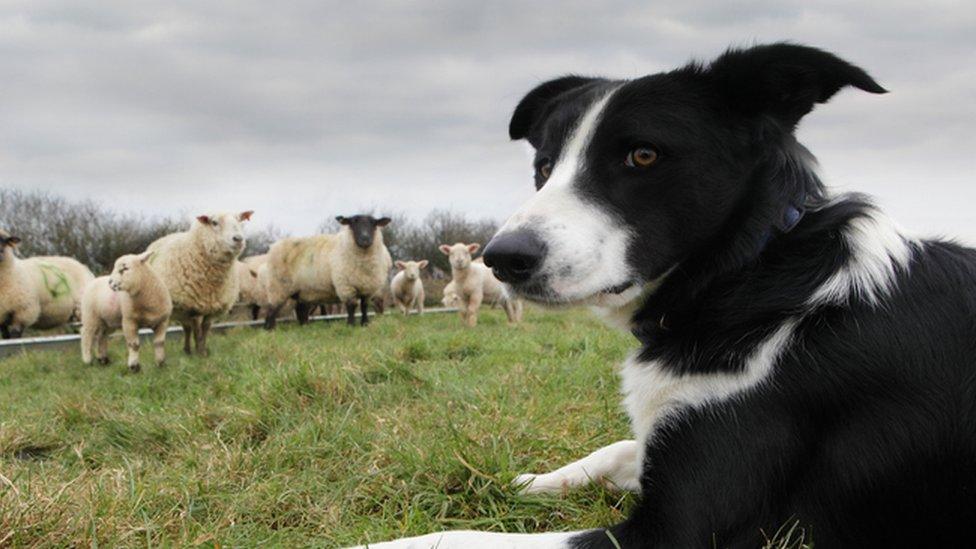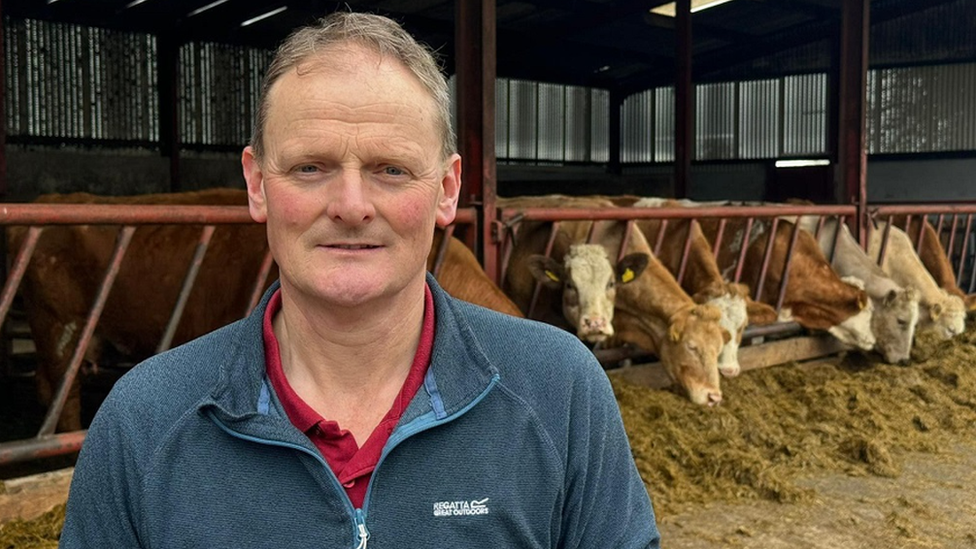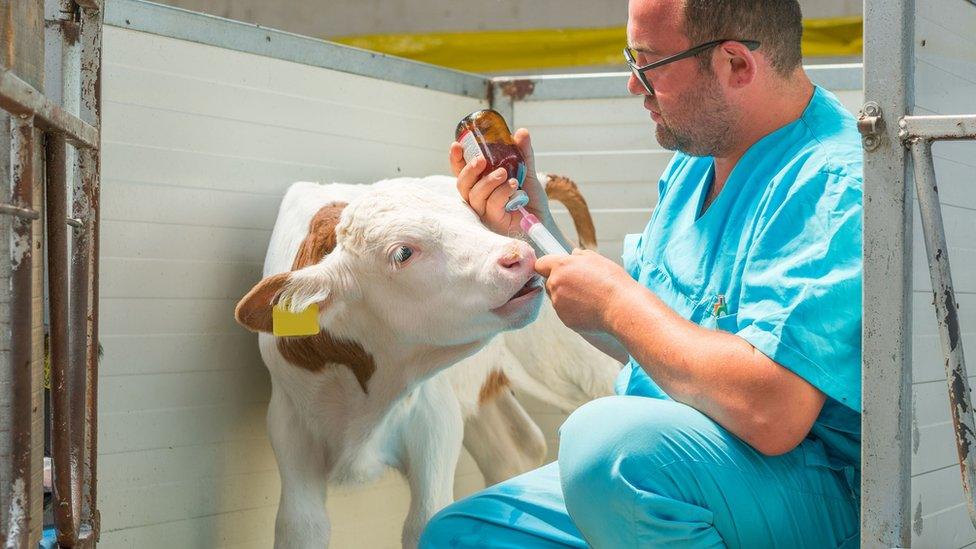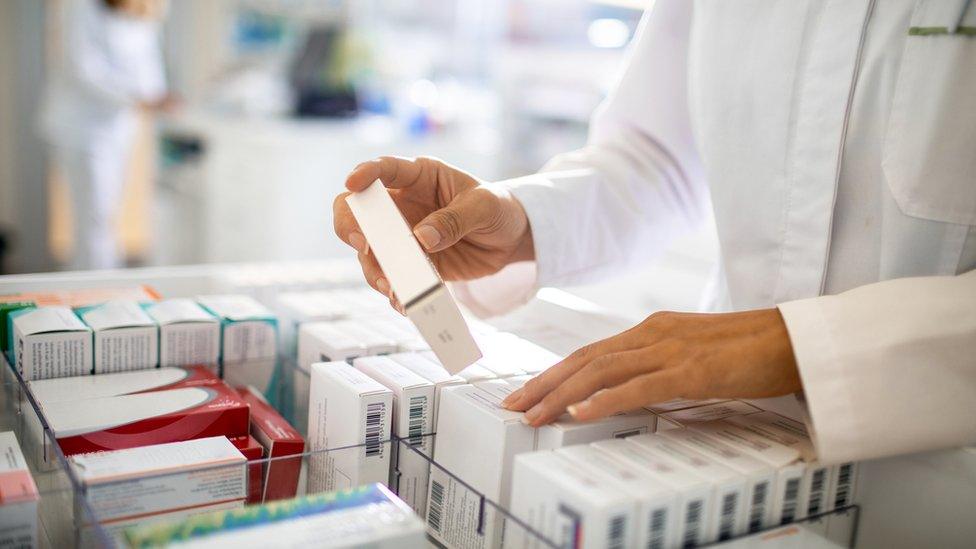Vet medicine supplies: Concerns over post-Brexit arrangements
- Published

Farmers from Northern Ireland have voiced concerns to a Westminster committee about the production and supply of veterinary medicines.
Farmers like David Brown rely on medicines to keep their animals healthy and to meet standards for putting them into the food chain.
But Brexit has made getting those medicines more complicated.
A grace period is in place but politicians say action is needed.
The grace period runs until the end of December 2025 but a cross-party House of Lords committee says the issue of veterinary medicine supplies to Northern Ireland - to protect animal and human health - needs to be looked at urgently
The House of Lords Windsor Framework Sub-Committee has written to Northern Ireland Office Minister Steve Baker with the findings of its inquiry into the issue.
Mr Baker is responsible for the implementation of the Windsor Framework.
In their letter, the committee members have endorsed a number of recommendations, including recognition for a GB-based Market Authorisation Holder and the importance of reaching a mutually-agreed solution.
They also asked the government several questions with a deadline of the end of June 2024 for a response.
They include whether an assessment has been made of the potential of a reduction in veterinary medicines for human health and the supply chain in Great Britain and Northern Ireland; what medicines are at risk of being discontinued; and what progress has been made in reaching a solution with the EU.
In a statement, a UK government spokesperson said it had secured a grace period and set up the Veterinary Medicines Working Group which was to report in the coming months.
This was "making positive progress towards identifying the steps needed to secure supplies for the long term", they added.
'Clarity needed'
As president of the Ulster Farmers' Union, David Brown was among those who gave evidence to the committee.
"It's important to recognise that about 50% of those [medicines] are for farm animals, but the other 50% are for our horses, our pets, companion animals," he said.
"For pharmaceutical companies who manufacture these products they don't do it on a whim in the past few weeks.
"Ultimately we need to see clarity and a decision taken."
A panel on veterinary medicines was set up as part of the agreement that saw the return of the Stormont Executive earlier in 2024.

David Brown appeared before a Westminster committee
Committee chairman Lord Jay of Ewelme said the stakes were "pretty high" around the issue.
He added that time was of the essence.
"I can understand why it's difficult to reach agreement now when you've got the uncertainty over elections in the United Kingdom, you've got uncertainty over elections to the European Parliament, you've got uncertainty over a new commission coming in.
"So I think it makes sense for the government to try to get its ducks in a row so that it can, when the time comes, start those negotiations pretty swiftly with the European Union and, we hope, find agreements with them."
Challenging issue
Medicines have been one of the most difficult post-Brexit trade issues in Northern Ireland.
That is because Northern Ireland has remained in the EU's single market for goods, a market which includes medicines.
However, Northern Ireland gets most of its medicines from distributors and manufacturers in Great Britain.
Under the terms of the original deal, the Northern Ireland Protocol, medicines being sent from GB to NI would have required retesting and relabelling to ensure they met EU standards.
The EU ultimately agreed to major changes for human medicines but veterinary medicines still face the prospect of needing to meet those retesting and relabelling requirements, and the risk they will be withdrawn from sale as a consequence.
Why does it matter?
Protecting animals from disease is an important element of the food chain.
There are also implications for companion animals or pets, and for show animals such as horses, which may not be able to travel for competitions if they are unable to access vaccinations.
About 85% of animal medicines authorised for use in Northern Ireland are registered to addresses in Great Britain, meaning they don't meet EU rules and additional checks would be required.
Because the market in Northern Ireland is small, any additional administrative burden could mean it would be economically unviable for some veterinary medicine manufacturers to make the required regulatory changes.
Some supply routes have already been altered to avoid additional checks being needed.
As a result, it is believed approximately a third of products currently remain at risk of being withdrawn.
The committee was warned that for products for which alternative supply routes cannot be found, technical discussions will be needed with the European Commission to maintain their availability.
There was also fear around "significant reputational risk" if there was a perception that the Northern Ireland agri-food sector could not access essential veterinary medicines.
The sector feeds an estimated 10 million people and concerns were also expressed about the impact of any disruption to production on UK food security.
Related topics
- Published19 January 2024

- Published18 January 2023
